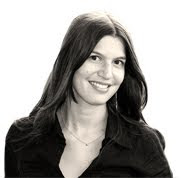Otsuka's first novel When the Emperor Was Divine follows a single family to the Japanese internment camps during WWII.
Before sharing an excerpt from her next project, Otsuka did something I've never seen done at a reading before—at least not before the official "reading": she talked at length about her family history and its influence on her work, shared bits of her bio, and offered insight into her writing process. It was as almost like an "A" without the "Q": she intuited the questions that may be asked and answered them.
I appreciated the contextualization of the author and her work. In fact, I was nearly as compelled by how she came to writing in the first place as I was by the gorgeous and gripping first-person-plural prose she eventually read. (I researched her biography further after I got home.) Julie arrived at Yale in the '80s thinking she'd study history. Then she took an art class and discovered a natural aptitude for sculpture and graduated with a degree in fine arts. Afterwards she pursued an MFA in painting, but plagued by self-doubt, she left after only a few months. It wasn't until years later, after trying and deserting the visual arts yet again, that she took a writing class ... and applied to an MFA program in fiction. Her first (slender) novel took her five-and-a-half years to write. Julie said that she labors over the diction and rhythm of each section, sentence, word, that she's lucky to write a page a week. It took her nine months to form the opening lines of a chapter in her first book.
Otsuka made clear that the writing process can be elusive and thrilling and befuddling. It can teach you things about your narrative that you didn't know and didn't plan. Her second novel, for example, emerged after she laid out sketches she'd done over a year and recognized a story arc. The book's narrated by a group of mail-order "picture brides" who sail from Japan to the States, simultaneously lose their virginities to their new husbands, give birth to children, and reluctantly relocate to internment camps in 1942. Her second novel ends where her first novel begins.
As an early career writer with a love of language and a host of unformed of half-formed or slippery fragments of narrative, with notebooks of sketches and indefinite ideas, I take comfort in her diligence and patience. Otsuka wasn't an early bloomer, but she has intensely important stories to tell. Her work is worth the wait.


No comments:
Post a Comment